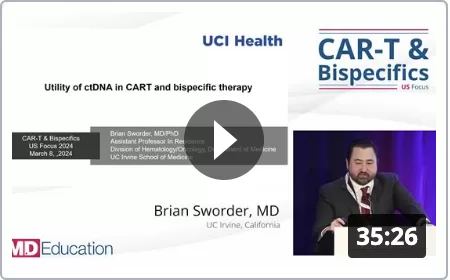Introduction
During the CAR-T & Bispecifics Conference, Dr. Brian Sworder, MD, from UCI Irvine, shared compelling insights on the utility of circulating tumor DNA (ctDNA) in the context of CAR-T cell therapy, particularly for relapsed refractory large B-cell lymphoma. This summary highlights the critical aspects of his presentation, emphasizing the revolutionary potential of ctDNA in predicting therapy outcomes and understanding resistance mechanisms.
The Significance of Circulating Tumor DNA in Oncology
Understanding ctDNA
Circulating tumor DNA consists of small fragments of DNA shed by tumor cells into the bloodstream. It serves as a non-invasive biomarker that can be analyzed to detect mutations, monitor disease progression, and assess therapeutic responses. Dr. Sworder elaborated on various ctDNA profiling methods, including high-throughput sequencing and digital droplet PCR, each with unique sensitivities and applications.
ctDNA in CAR-T Cell Therapy
The focus of Dr. Sworder’s research is the application of ctDNA in evaluating response and resistance to CAR-T cell therapies, particularly anti-CD19 CAR-T cells, which have significantly improved outcomes for patients with relapsed refractory large B-cell lymphoma. Despite the success, approximately 50% of patients experience relapse, highlighting the need for improved predictive tools.
Multimodal ctDNA Profiling: A Case Study
Study Overview
Dr. Sworder anchored his presentation on a study that utilized a multimodal platform to analyze cell-free DNA and ctDNA in patients undergoing CAR-T cell therapy. This innovative approach allowed for the simultaneous characterization of tumor intrinsic and extrinsic factors influencing therapy response.
Key Findings
The study demonstrated that ctDNA levels provide a reliable measure of tumor burden and response to CAR-T therapy. Notably, patients who achieved a significant reduction in ctDNA levels by day 28 post-infusion had markedly better outcomes. Furthermore, specific genomic alterations detected through ctDNA profiling were associated with resistance, offering insights into the complex dynamics of tumor evolution under therapeutic pressure.
Implications and Future Directions
Enhancing Therapy Prediction and Monitoring
The ability to predict outcomes and monitor response through ctDNA levels could revolutionize treatment protocols for lymphoma and other cancers. Dr. Sworder highlighted the potential of integrating ctDNA profiling into routine clinical practice, especially for assessing minimal residual disease and early detection of relapse.
Expanding the Utility of ctDNA
The conference discussion underscored the broader applicability of ctDNA across various hematopoietic cancers, including multiple myeloma. Dr. Sworder’s work suggests that ctDNA profiling can extend beyond B-cell lymphomas, potentially offering a universal biomarker for immune-based therapies.
Conclusion
Dr. Brian Sworder’s insights into ctDNA utilization in CAR-T cell therapy represent a significant step forward in personalized oncology. By providing a deeper understanding of tumor behavior and therapy response, ctDNA profiling stands to enhance therapeutic outcomes and refine cancer management strategies. As research progresses, the integration of ctDNA analysis in clinical settings promises to transform the landscape of cancer treatment, paving the way for more targeted and effective interventions.
Resources:

